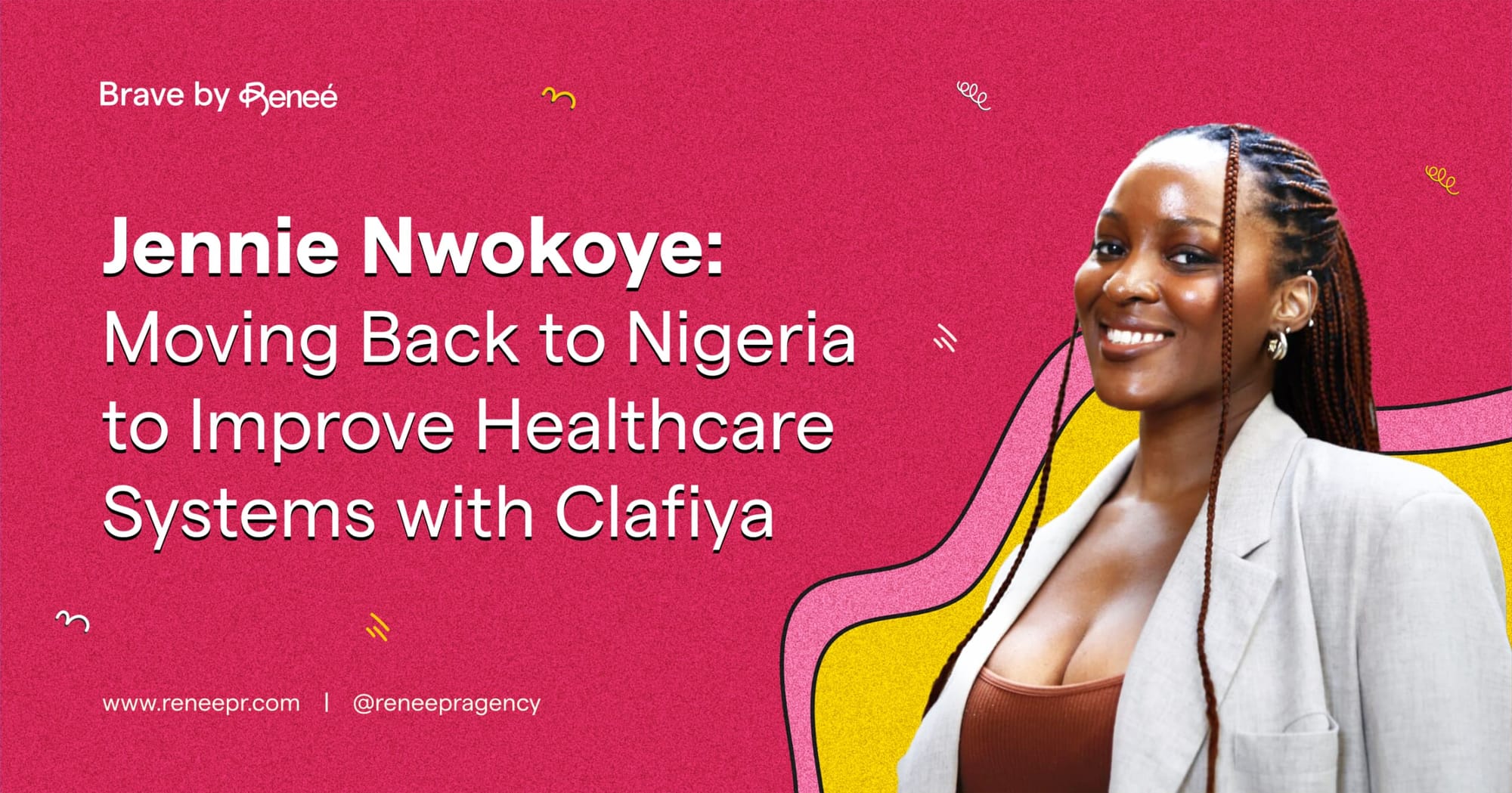Jennie Nwokoye: Moving Back Home to Improve Healthcare Systems with Clafiya
To wrap up Women’s History Month, we caught up with Jennie Nwokoye, the founder/CEO of a health tech startup, Clafiya for our Brave Series.

Jennie Nwokoye was born and raised in the United States but relocated to Nigeria in 2001. As a child, she heard stories about Nigeria, which made her reluctant to come home, and upon her return, she started plotting ways to go back to the U.S. However, she would later be influenced by childhood memories formed at the schools she attended, which became a part of her foundation.
Jennie attended two secondary schools in Nigeria, which played a pivotal role in developing her spirituality and long-lasting friendships, as well as igniting her love for the Igbo culture. In the later years, she would come to appreciate the impact of her parents’ decision to move back home, as it exposed her to the realities of Nigeria’s inefficient healthcare systems, revealing its many challenges, and how she could be a part of this big movement, proffering significant solutions to these problems.
After her junior secondary school education in Nigeria, Jennie and her family returned to the United States, where she eventually completed her high school education and obtained a bachelor's degree in Biomedical Science from the University of South Florida. She also earned a Master's in Forensic Sciences from Georgetown University, which was fueled by her love for solving crimes. Jennie was set to make her mark in the world.
Career Journey
Jennie’s career kicked off with an internship at the U.S. Secret Service, and because of the technicality of her role at the agency, she discovered an affinity for Systems Engineering. This is not surprising, as Jennie describes her personality as purpose-driven and methodical, and these complement the characteristics of engineering: systemic and process-oriented.
Determined to become an expert, she earned another Master’s degree in Systems Engineering at Georgetown University. Unlike her previous academic experiences where she had been shy, more reserved and focused solely on academics, she made a conscious effort to make the most out of her time at Georgetown. Jennie also got accepted for a PhD programme, which she had to put on hold.
She subsequently explored other roles, including working as a Systems Consultant at Deloitte and a Programs Manager at Amazon, which she eventually left to pursue entrepreneurship.
The Birth of Clafiya
A childhood memory that shaped Jennie’s entrepreneurial journey came from an experience she vividly attributes to reinforcing her decision to build a health technology startup that could provide Nigerians with speedy responses to health issues. She recalls a health emergency her family experienced:
“When we moved to Nigeria, my sister was just a baby, and I remember one weekend we were playing outside, and I heard my mom screaming the blood of Jesus,” she narrated. “We ran upstairs, and I remember seeing my sister choking on her food. In that situation in the U.S., you’d typically call 911, but here in Nigeria, what do you do? I just remember my mom praying and putting anointing oil on her head, and soon after, my sister was fine.” She narrated.
This experience, she admits, was part of the reason her family moved back to the United States because they had access to better healthcare systems there than they could have in Nigeria. For her, the problems were more about accessibility than affordability.
In 2016, as an adult visiting Nigeria, Jennie realised that the healthcare challenges that necessitated her family's relocation back to the U.S. had not improved. This formed the basis for her undertaking a dissertation on 'access to efficient healthcare systems in Nigeria' for her Master's Program. With the help of her lecturers, she reimagined the topic as a business idea, which would later become ‘Clafiya’.
Jennie started participating in competitions and pitching the business idea to investors, and soon after, she got Clafiya into the Google Accelerator programme to develop the technology to solve healthcare system accessibility issues in Nigeria.
The startup secured funding from Microtraction, prompting Jennie to focus on building Clafiya and return to Nigeria at a time when young Nigerians were emigrating, colloquially referred to as "Japa," due to increased unemployment rates, insecurity, and human rights concerns. And so in July 2021, she left her job at Amazon.
Building Clafiya
Clafiya is a health tech startup that makes it easy for people to access primary healthcare services by bringing the ‘care’ to them, wherever they are. The platform takes care of all logistical aspects of healthcare needs, from booking appointments to liaising with healthcare providers, allowing users to focus solely on their well-being.
Users can join the platform free of charge and gain access to skilled healthcare professionals and a variety of services delivered through virtual consultations and home visits. If medications are prescribed, Clafiya arranges delivery or directs users to the nearest pharmacy.
For payment, the platform operates a wallet system where users deposit funds into their wallet, and charges are deducted as services are used. This wallet can also accommodate beneficiaries, allowing family members to access healthcare services.
Building a startup is challenging, and Jennie admits that building Clafiya hasn’t exactly been a walk in the park. A prominent challenge has been finding the right talent for Clafiya. Apart from that, the complexity often found in Nigerian business environments and the economy has also been impeding factors affecting the business. Jennie is determined to maintain her values and those of the business, despite the bureaucratic nature of the country.
While acknowledging the prevalent reactive approach to healthcare among Nigerians and the potential reluctance to embrace innovative solutions like Clafiya, Jennie is on a mission to promote a proactive healthcare mindset, making it an integral part of everyday life for Nigerians. This commitment has yielded remarkable results, with Clafiya successfully onboarding over 3,000 active users to the platform. Notably, in July 2023, the company announced raising an impressive $610,000 in pre-seed funding.
In 2024, Jennie decided to return to Nigeria permanently to build Clafiya. Before making this decision, she shuttled between Nigeria and the United States. Though Jennie was reluctant to move permanently to Nigeria, she disclosed that her decision was propelled by a deep spiritual reflection.
“I didn't have any plans on moving until 2022, and I just remember praying a lot about it. As I was praying, I asked God and referenced Abraham, when he told him to leave where he was living and go to a place where he would show him and bless him. And so that was what helped me decide to move to Nigeria,” Jennie said.
The Journey Ahead
In addition to advancing healthcare accessibility for Nigerians, Clafiya is actively promoting women's inclusion in the industry by being a women-led company. Jennie notes that this was not a deliberate decision; however, over time, it has evolved into a deliberate effort aimed at enhancing female representation within the industry.
When asked about fostering inclusivity within the company, she highlights a balanced gender distribution and women taking on more leadership roles within the organisation, reflecting Clafiya's commitment to gender parity and empowerment. This deliberate move towards gender diversity not only aligns with Clafiya's core values but also contributes to creating a more inclusive and equitable healthcare ecosystem.
By championing women's inclusion in the industry, Clafiya is not only driving positive change within its organisation but also inspiring broader societal representation towards gender equality in healthcare.

